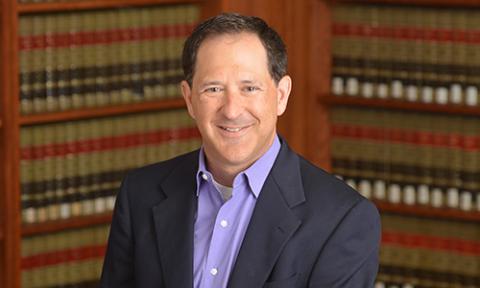Answering the Call: Q&A With Interim Dean Russell Korobkin

A member of UCLA School of Law’s faculty for more than two decades, Russell Korobkin is the Richard C. Maxwell Distinguished Professor of Law, and he has served as vice dean for the last seven years. With the departure of Dean Jennifer L. Mnookin – who will become the chancellor of the University of Wisconsin-Madison next month – Korobkin answered a new call to service at the law school that has been his home since 2001.
On June 13, he started work as UCLA Law’s third-ever interim dean. He will hold the position until a new dean is chosen through an exhaustive national search.
Korobkin is an authority in negotiation and behavioral law and economics. His recent book The Five Tool Negotiator: The Complete Guide to Bargaining Success (Liveright, 2021) just went into paperback. And he founded UCLA Law’s innovative Master of Legal Studies program for professionals who seek legal training but do not intend to become lawyers.
During his first trip to New York as interim dean, Korobkin took time out from meeting with alumni to discuss his path to the UCLA Law dean’s office – and what he expects to see on the road ahead.
Having worked closely with Dean Mnookin and other top administrators at UCLA for many years now, what do you see as the most effective leadership skills and strategies?
The most important thing about being the dean of a law school is to remember that you work for the students, faculty, staff, and alumni. UCLA Law is a large, varied, and complex organization. We have such great people on the faculty and staff, so, mostly, I’ll be figuring out how to balance competing needs, and work within constraints, so that everyone can succeed.
As an expert in negotiation and behavioral law, what do you bring to the interim dean role?
I think my best attributes for the job are the willingness to listen and being able to see both sides of complicated issues. In any organization, but especially in a university setting where you’re dealing with very smart, very capable people, sometimes worthy goals come into conflict with one another. Part of my job is to try to mediate in those situations. Hopefully, I have a pretty good perspective that will help me to do that.
What are some of your top priorities as interim dean?
In keeping with the three core elements of UCLA’s mission — education, research, and public service — we need to continue to recruit and support the best faculty who are both thought-leaders in their fields and committed teachers. It’s essential for a top law school to have a portfolio of experts across the range of law, and retirements and departures mean this is a priority every year. We also need to focus, as always, on bringing to UCLA Law the next group of exceptional students, who will be leaders and innovators in the profession. This year, I hope to emphasize building interpersonal bonds within our community, which I think has been frayed a little bit by the physical distancing required by the pandemic. I also think we need to turn our attention to the law school’s physical infrastructure. I think that’s going to be a major focus over the next several years. Over the last decade, we’ve added a tremendous number of new programs, centers, clinics – all manner of intellectual ferment and hands-on opportunities. We need to insure we have the right physical space for all of these to flourish.
About the pandemic and building bonds, how do COVID-19’s ongoing challenges factor into your thinking?
My hope is that the pandemic will continue to recede and allow us to reconnect in person. I want to encourage everyone in our community to take time to rekindle their relationships. It’s a basic but important thing that we need to focus on this year. In the last two years, we’ve done a remarkably good job of delivering quality education under difficult circumstances, but there hasn’t been the personal contact that enriches the entire educational experience. Like other institutions, we need to find the right balance between the convenience that technology provides — we don’t need to have every meeting in person — with the element of personal connection that’s so critical to learning and coming up with new ideas. That’s lost if you don’t have a certain amount of face-to-face interaction. We need to find our equilibrium between those things.
Finally, could you tell us just a little bit more about yourself? For example, what is one thing that we might be interested to learn about Interim Dean Russell Korobkin?
I’ve spent a lot of time over the last decade or so coaching my daughter’s teams in softball, soccer, and basketball. She’s outgrown my coaching now, so it is an ideal time for me to take on the rigors of deaning!